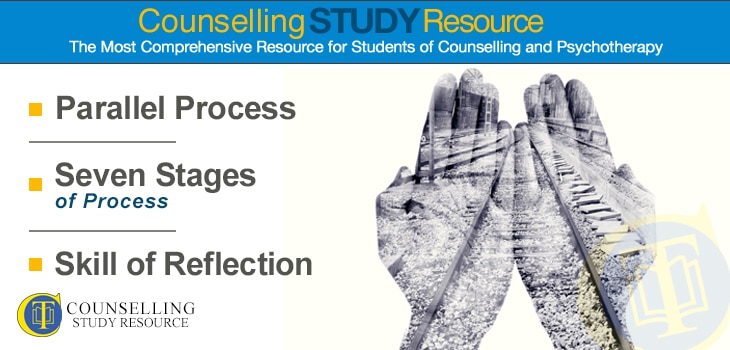002 – Parallel Process – Seven Stages of Process – Skill of Reflection
In this second episode of the Counselling Tutor Podcast, Ken Kelly and Rory Lees-Oakes speak about the idea of the ‘wounded healer’. ‘Theory with Rory’ looks at the seven stages of process; and in the skills section, Ken introduces the skill of reflection in counselling.
Parallel Process
Coined by psychologist Carl Jung and drawing on the Greek myth of Chiron, the concept of the wounded healer suggests that we may be drawn to become therapists because of pain we have faced in our own lives.
This means there can sometimes be similarities between our own and a client’s situations; this is known as ‘parallel process’. The dangers are that we may not realise this and so react from our own frame of reference – or, if we do notice, we may think the solution we found will work for our client, and inadvertently become directive in our approach.
Rory and Ken explore how to recognise parallel process (through ‘helicoptering’) and what to do when you see it happening, including the importance of taking the issue to supervision.
The Seven Stages of Process
Rory examines this theory by Carl Rogers, who believed that (so long as the core conditions are present) people move through different stages of process – from a place of rigidity to becoming a fully functioning person. The model is useful for supervision, providing a common language to discuss where clients are at.
It is rare to see clients who have voluntarily entered counselling in stages 1 or 2:
- Stage 1: People will not speak about feelings openly, and tend to blame others for causing their pain, rather than take responsibility for themselves. A typical statement might be: ‘If only my friend would stop doing that, I’d feel better.’
- Stage 2: There is slightly less rigidity, with a slight movement towards wondering whether responsibility should be taken by self, but not actually doing so: ‘It’s not my fault; it’s theirs – isn’t it?’
It is at stage 3 or 4 that we may see a person enter our therapy room:
- Stage 3: The person is beginning to consider accepting responsibility for self, but generalises, and focuses more on past than present feelings: ‘I felt angry, but then everyone does, don’t they?’
- Stage 4: The client begins to describe their own here-and-now feelings, but tends to be critical of self for having these: ‘I feel guilty about that, but I shouldn’t really.’
Finally, stages 5 to 7 represent further personal development:
- Stage 5: Clients express that they are seeing things more clearly, and take ownership of their situation, being prepared to take action: ‘I’m not surprised I’m angry with my boss after what I’ve been through. So I’ve quit my job.’
- Stage 6: The client recognises their own and others’ process towards self-actualisation: ‘I accept that pain within me, and what I and others did. I feel a warmth and compassion towards myself and them for where I am at.’
- Stage 7: We are likely to see a fluid, self-accepting person who is open to the changes that life presents. Examples of people at this stage might be Mahatma Gandhi, Mother Theresa and Nelson Mandela.
Rogers identified that the journey between stages is not linear (with people moving both ways), but that by stage 6, progress is more secure, and that self-growth is able to continue without the counsellor.
The Skill of Reflection in Counselling
Ken explores the skill of reflection – which he terms ‘the lost skill’ – and urges that trainee counsellors contract with their peers to audio-record their skills sessions in college.
Reflection may seem simple – merely repeating the clients words back to them – but there is a deeper side to this counselling skill. It can make the client feel heard, reinforce unconditional positive regard, build rapport and trust, and help the client focus and move on in their process. As counselling involves listening to ‘the music beneath the words’, reflecting can pick up on feelings within the story, and help take the client deeper. It also helps the counsellor to clarify the client’s meaning.
You will hear a simulated counselling skills session where reflection is used.


